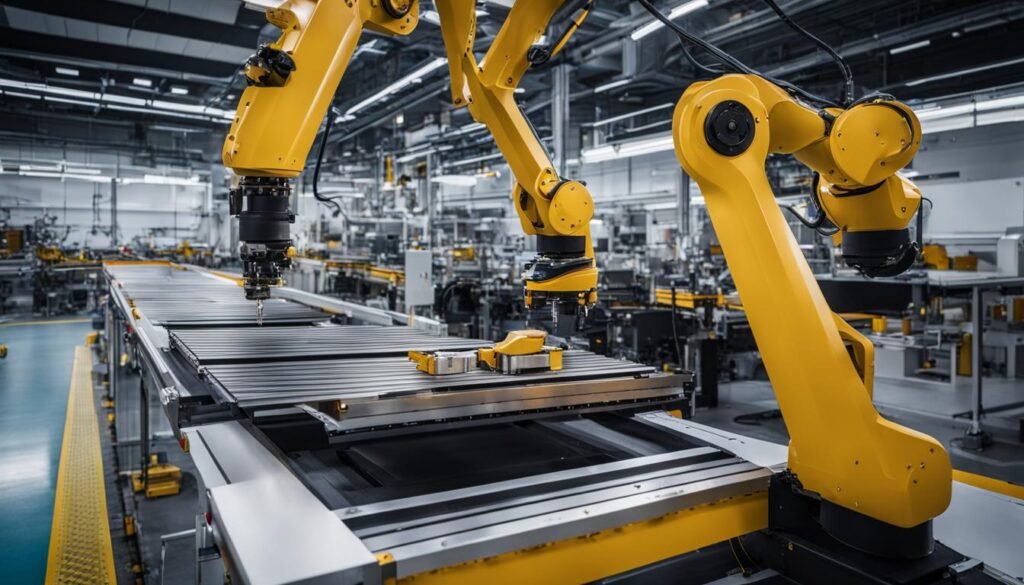
Unlocking the Advantages of AI in Manufacturing Today

AI has revolutionized the manufacturing industry, offering numerous advantages that enhance productivity, increase efficiency, and drive cost savings. By harnessing AI technology, manufacturers are able to optimize processes, improve decision-making, and unlock new levels of innovation. With its ability to analyze large amounts of data and make predictions, AI is transforming the manufacturing sector in various ways. Let's explore the specific advantages of AI in manufacturing.
Key Takeaways:
- AI in manufacturing offers advantages that enhance productivity and drive cost savings.
- By automating repetitive tasks, AI systems increase efficiency and free up employees to focus on more valuable tasks.
- AI-powered quality control systems detect anomalies and ensure products meet high standards.
- Through predictive maintenance, AI can anticipate equipment failures and reduce downtime.
- AI technology is transforming the manufacturing sector by improving decision-making and enabling proactive strategies.
- What are the advantages of AI in manufacturing?
- How does AI increase efficiency and productivity in manufacturing?
- How is AI transforming quality control in the manufacturing industry?
- What role does AI play in predictive maintenance in manufacturing?
- What are some keywords related to AI in manufacturing?
Increased Efficiency and Productivity
One of the primary benefits of artificial intelligence in manufacturing is its ability to significantly increase efficiency and productivity. By harnessing AI solutions, manufacturers can optimize their operations and streamline processes, resulting in improved performance and cost savings.
AI-powered systems have the capability to automate repetitive tasks that were once time-consuming for human workers. For example, AI algorithms can be utilized to automate quality control processes, ensuring that products meet high standards and reducing the risk of human error. This not only enhances the overall quality of the products but also frees up employees to focus on more value-added tasks that require creativity and critical thinking.
See Also... Overcoming the Challenges of Implementing AI: A Guide
Overcoming the Challenges of Implementing AI: A GuideFurthermore, AI algorithms are capable of optimizing production schedules by analyzing real-time data. By identifying bottlenecks and inefficiencies in the manufacturing process, AI systems enable manufacturers to make data-driven decisions and take corrective actions promptly. This ultimately minimizes downtime, maximizes output, and improves operational efficiency.
Overall, the impact of AI in manufacturing is undeniable. By increasing efficiency and productivity, AI solutions empower manufacturers to achieve higher output levels, reduce costs, and gain a competitive edge in the market.
| Benefits of AI in Manufacturing | Impact |
|---|---|
| Increased efficiency | Streamlined operations, reduced human error, and optimized production schedules. |
| Improved productivity | Maximized output, minimized downtime, and freed up employees to focus on value-added tasks. |
| Enhanced quality control | Automated quality control processes, reduced defects, and ensured products meet high standards. |
| Cost savings | Optimized resource allocation, reduced wastage, and improved operational efficiency. |
"AI solutions have revolutionized the manufacturing sector by streamlining operations, automating repetitive tasks, and optimizing resource allocation. The impact of AI in manufacturing is evident in the increased efficiency, higher productivity, and improved quality control that manufacturers can achieve. By leveraging AI technology, manufacturers can unlock new levels of innovation and gain a competitive advantage in today's fast-paced market."
See Also...Exploring the Future of AI Technology: What's Next?
Improved Quality Control and Predictive Maintenance
AI technology is revolutionizing the manufacturing industry by enhancing quality control processes and enabling proactive maintenance strategies. With AI in the manufacturing sector, manufacturers can ensure that their products meet high standards and avoid costly breakdowns.
AI-powered systems play a crucial role in quality control by detecting anomalies in production lines. By analyzing data from sensors and cameras, AI algorithms quickly identify patterns and deviations, allowing manufacturers to take immediate corrective action. This real-time monitoring enables companies to maintain consistent product quality and identify any defects before they reach the market.
Additionally, AI-driven predictive maintenance systems are transforming the way manufacturers approach equipment maintenance. By monitoring equipment performance and analyzing historical data, AI can predict potential failures and optimize maintenance schedules. This proactive approach helps prevent unexpected breakdowns, minimize downtime, and save manufacturers both time and money.
See Also... Discover the Top AI Companies Revolutionizing Technology
Discover the Top AI Companies Revolutionizing TechnologyOverall, AI in the manufacturing industry is revolutionizing quality control and maintenance practices. Manufacturers can now leverage the power of AI to ensure product excellence, enhance operational efficiency, and drive sustainable growth in this rapidly evolving sector.
FAQ
What are the advantages of AI in manufacturing?
AI in manufacturing offers numerous advantages such as enhanced productivity, increased efficiency, and cost savings. It helps optimize processes, improve decision-making, and unlock new levels of innovation.
How does AI increase efficiency and productivity in manufacturing?
AI-powered systems automate repetitive tasks, optimize production schedules, and analyze data in real-time to identify bottlenecks and inefficiencies. This leads to higher productivity, reduced downtime, and cost savings for manufacturing companies.
How is AI transforming quality control in the manufacturing industry?
AI-powered systems can detect anomalies in production lines, identify defects, and ensure products meet high standards. By analyzing data from sensors and cameras, AI algorithms enable manufacturers to take corrective action in real-time, improving quality control processes.
What role does AI play in predictive maintenance in manufacturing?
AI-driven predictive maintenance systems can anticipate equipment failures by monitoring performance and analyzing historical data. This allows manufacturers to optimize maintenance schedules, prevent costly breakdowns, and save time and money.
Keywords relevant to AI in manufacturing include advantages of AI in manufacturing, AI benefits in manufacturing, AI technology in manufacturing, AI applications in manufacturing, benefits of artificial intelligence in manufacturing, AI solutions for manufacturing, impact of AI in manufacturing, AI in the manufacturing industry, and AI revolutionizing manufacturing.
Source Links
- https://www.mdpi.com/2227-9059/11/12/3201
- https://seller.alibaba.com/businessblogs/px0029dcd-what-is-b2b-e-commerce-and-how-to-start
- https://www.pymnts.com/news/retail/2023/mastercard-debuts-ai-powered-muse-to-offer-shoppers-inspiration/
If you want to know other articles similar to Unlocking the Advantages of AI in Manufacturing Today you can visit the Blog category.
Leave a Reply







Related Post...